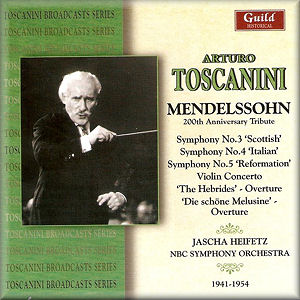 |
 |
|


alternatively
CD:
AmazonUK
AmazonUS
|
Felix MENDELSSOHN
(1809-1847)
Symphony No.3 in A minor, Op.56 Scottish (1842) [32:42]
Symphony No.5 in D, Op.107 Reformation (c.1840) [26:51]
A Midsummer Nights Dream, Op.21 (1829) and Op.61 (1843) -
I. Overture. Allegro di molto [11:43]: II. Song and Fairy Chorus
Ye Spotted Snake [3:46] ¹
Overture - The Hebrides, Op.26 (1832) [9:19]
Overture - Die schöne Melusine, Op.32 (1833 rev 1835)
[8:50]
String Quintet No.2 in B flat, Op.87 - III. Adagio e lento (1845)
[7:54]
Violin Concerto in E minor, Op.64 (1844) [23:39] ²
Symphony No.4 in A major, Op.90 Italian (1833) [25:54]
 Edna Philips (soprano) ¹
Edna Philips (soprano) ¹
Jascha Heifetz (violin) ²
NBC Symphony Orchestra/Arturo Toscanini
rec. 1941-54.
 GUILD GHCD2358-59 [75:55 + 76:18]
GUILD GHCD2358-59 [75:55 + 76:18] 
|
|
|
Though there is nothing new for the Toscanini broadcast collector
in this commemorative twofer, it does handily enshrine pretty
nearly all the conductor’s extant Mendelssohn performances.
Missing is the Octet performance and the 1945 broadcast of the
wind version of the same work’s Scherzo - a rare outing
for that work from anyone at the time.
Under the rubric of the 200th Anniversary of the
composer’s birth this Guild offering is tightly packed,
well transferred, briefly, and usually cogently annotated by
Robert Matthew-Walker, who seems to claim we are hearing the
1938 broadcast of the Italian symphony whereas we are
actually presented with the 1954 broadcast. Maybe he was misinformed,
because the track details are unambiguous on the subject.
As for the Scottish, this was his solitary performance
of it with the NBC, with whom he performs all the broadcasts
here. Malleably intense, harmonic scrutiny tends to win out
over genuine lyricism and there are moments of inflated orchestral
thrust. The second moment is hardly Vivace non troppo
as marked, though it is characteristically exciting, whilst
the slow movement is borne lightly, deftly and relatively quickly.
The NBC flies by the seat of its collective pants in the finale
where articulation comes under pressure. After the disappointment
of the Scottish, the Reformation comes as balm
though it too is not without its idiosyncrasies. The opening
is finely controlled and Toscanini’s control of rubati
is acute. The rhythmic bases of the music are equally well judged,
though it’s certainly not a conventional approach. He
is unusually expansive in the last movement, and this sense
of stately pacing actually brings an increase in tension and
an anticipation of the great chorale that is unleashed at the
optimum moment with no little glory and solemnity. Is this Toscanini’s
best single Mendelssohn performance? I tend to think so. The
Midsummer Night’s Dream music is rather too taut,
and is not really his kind of thing. It’s enjoyable to
hear the brief Ye Spotted Snakes with soprano Edna Philips
piping away.
Piping away is certainly not something that could ever be said
of Jascha Heifetz. He and Toscanini never recorded the concerto
commercially, thank God. The Vilnius wunderkind’s commercial
outings in the work were pretty mediocre (Beecham, Munch) and
his live meeting with Toscanini’s musical son, Cantelli,
was an outright disaster. Breathless swank is the name of the
game for this Toscanini meeting. He relaxes for the slow movement,
it’s true, where one hears Toscanini moaning in sympathy,
but Heifetz makes much of the passagework elsewhere sound like
Rode. The hooded finger position intensifications only make
it the more awful. Toscanini is no better. Fortunately we can
listen to the Italian Symphony in a performance that
doesn’t push the bounds of the music too far. There’s
highly impressive control of localised detail but never at the
expense of the architectural whole. Note the stalking lower
strings in the slow movement and the cumulative fervour of the
finale. The Hebrides is strongly argued with a good atmospheric
quotient, but not at all rigid. And Die schöne Melusine,
whilst quite brisk, is not overstated, its bass line remaining
strongly defined. A most unusual example of inflation comes
in the shape if the slow movement of the String Quintet No.2
in B flat, which allows for rich cantilena.
This is a handy twofer, well transferred. The performances are
predominantly good.
Jonathan Woolf
see also review by John
Sheppard
|
|




 All Nimbus reviews
All Nimbus reviews








